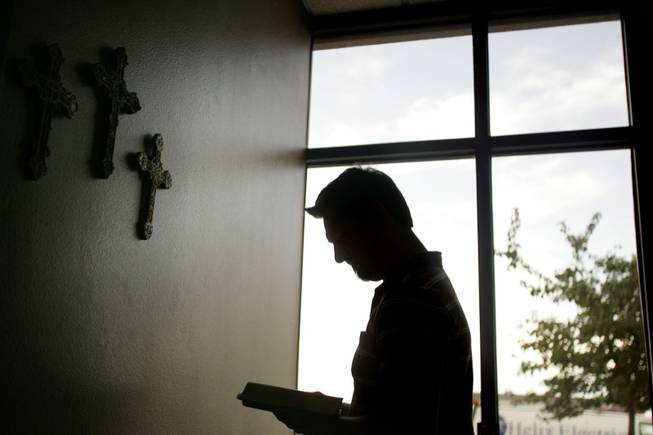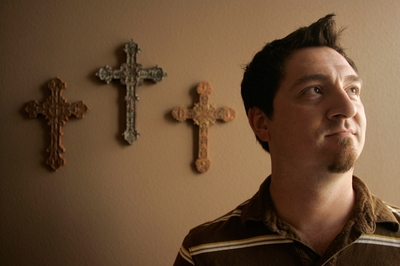
Dwight Watson, pastor of The River Fellowship, says John McCain’s running mate, Sarah Palin, helps the candidate solidify his evangelical base.
Tuesday, Sept. 9, 2008 | 2 a.m.
Beyond the Sun
For months, Nevada-based Republican consultants had been saying presidential nominee John McCain had failed to excite religious and social conservatives, who appeared so disillusioned they might avoid the ballot box altogether on Election Day.
McCain, they said, needed to select a running mate with solid enough conservative credentials (read: anti-abortion, thus ruling out moderate Connecticut Sen. Joe Lieberman) to tap into what has become a reliable voting bloc for the party. Enter Alaska Gov. Sarah Palin.
“I bet most (evangelicals) would have supported McCain halfheartedly, but he needed to energize them to encourage others to come onboard — people at work, people at church,” said Steve Wark, a Republican consultant who in 1988 led one of the first successful campaigns in Nevada to band evangelicals together. “That communication often is critical in a close election.
“I believe Sarah Palin energized the base.”
Palin, who freely discusses her Christian faith, has indeed awakened the religious base of evangelicals, Mormons, Catholics and Jews — a voting bloc Democrats have been hoping to splinter this cycle.
“For McCain, the danger was that these voters would stay home,” said Nancy Ammerman, a professor of the sociology of religion at Boston University’s School of Theology. “He’s got them now.”
But adding Palin to his ticket is not expected to bring as big a bump to McCain’s numbers in Nevada as it will elsewhere, because the number of evangelicals in Nevada, as a percentage of voters, is not as high as it is nationwide.
Democrats — including Bill Clinton in 1992 and 1996 — have occasionally siphoned off poorer evangelicals, according to Michael Hout, a professor of sociology at the University of California, Berkeley.
And Democratic presidential nominee Barack Obama is trying to appeal to evangelicals — by speaking regularly about how his faith has shaped him and, last month, engaging with prominent evangelical Rick Warren in Southern California.
In Nevada, evangelicals represent about 12 percent of the state’s voters, according to exit polling by CNN in the 2004 election. That is about half the national average, so their voting patterns aren’t as closely scrutinized here.
But some people have gut feelings, such as the Rev. Vance Pitman, who came here from Alabama eight years ago and is pastor of Hope Baptist Church. “I think the evangelical community in Nevada is just as strong of a voting bloc as Alabama,” he said. “It’s just smaller.”
In 2004, 94 percent of white conservative Protestants — a group that encompasses more than Christian evangelicals — supported President Bush, according to CNN exit polling.
Not only is there a smaller percentage of evangelical voters in Nevada, but they are less organized, Wark says.
He thinks they’re solidly behind Palin, because she’s not self-conscious about her faith, and thus support McCain. But tapping the evangelical vote in Nevada is more challenging than it might be elsewhere because the community lacks a grass-roots political organization.
“In running a campaign, I don’t take it as a homogenous group,” Wark said.
The 1988 presidential campaign of televangelist Pat Robertson in Nevada was one of the first here to try to band evangelicals together, cementing the rise of the “Reagan Democrats.” The movement tapped into an emerging awareness in Nevada’s evangelical community that they “should be involved and could be involved,” Wark said.
Over a three-month period in 1988, Wark held about 75 meetings across the state with thousands of evangelicals, explaining why it was important to vote Republican. He’d gather evangelicals in parks, in hotel parking lots during shift changes, but never in a church. That’s not an accident; pastors valleywide say they use the pulpit to preach values, not to promote politics because that would be a violation of their federal tax exemption.
Robertson won the state, capturing all of Nevada’s delegates to the Republican National Convention in 1988.
A number of those delegates ultimately entered politics themselves, but since that election, the organization has slowly dissipated, Wark says. A movement earlier this decade to protect marriage as a union between a man and a woman briefly reignited it.
Although evangelicals remain a solid bloc for Republicans this year because of shared values, there are signs that support for the party may not be as overwhelming as in 2004 — even with the addition of Palin to the ticket.
“It’s fair to say evangelicals are seen as a cohesive voting bloc,” said Dwight Watson, pastor of The River Fellowship, a growing movement of “house churches” in the valley. “But I think this year won’t be as much. There’s a lot of tension in this election.”
Democrats have appealed to evangelicals, promoting their efforts to curb global warming and promote social justice.
Regarding social justice, and specifically opposition to abortion, “we’d say both of these are God issues,” said Kevin Odor, senior pastor of Canyon Ridge Christian Church. In Pitman’s church, politics comes up only when it intersects with morality. Hope Baptist just completed a series called The Simple Life that promoted the biblical definition of marriage as between a man and a woman.
“To me, it’s not a political issue,” he said. “It’s a moral issue, a social issue. A lot of these issues, unfortunately, have been labeled political. It was social before it was political.”


Join the Discussion:
Check this out for a full explanation of our conversion to the LiveFyre commenting system and instructions on how to sign up for an account.
Full comments policy